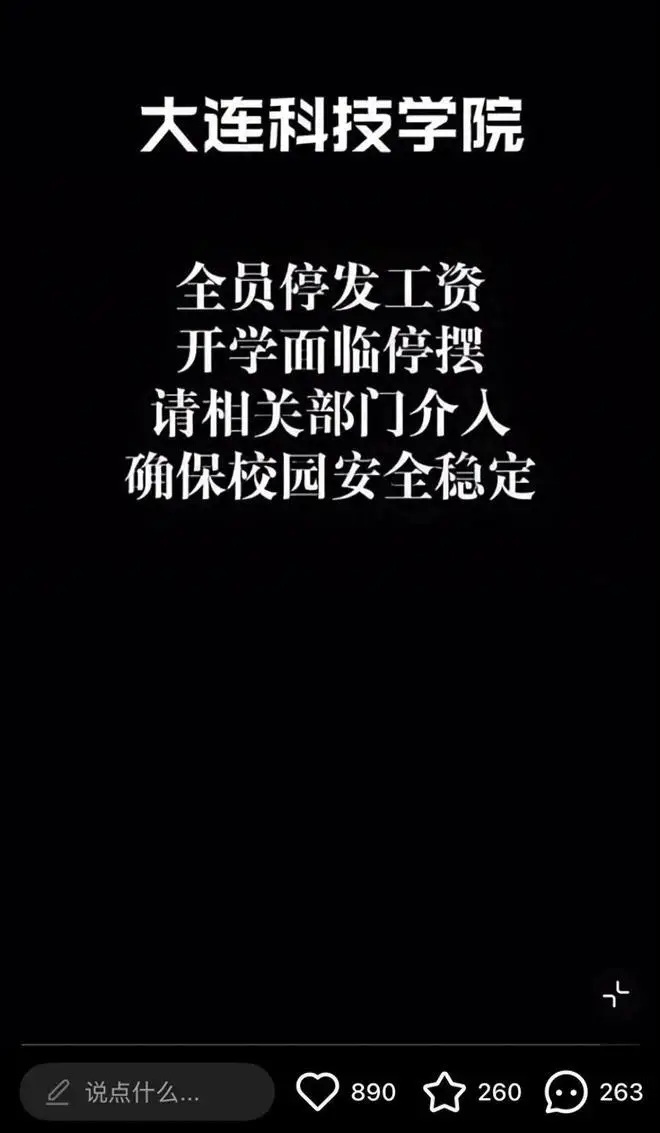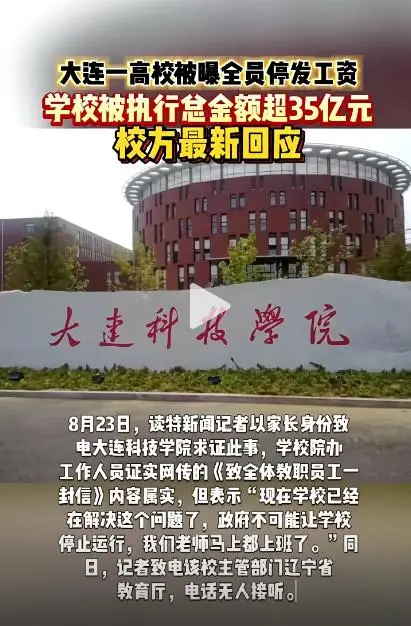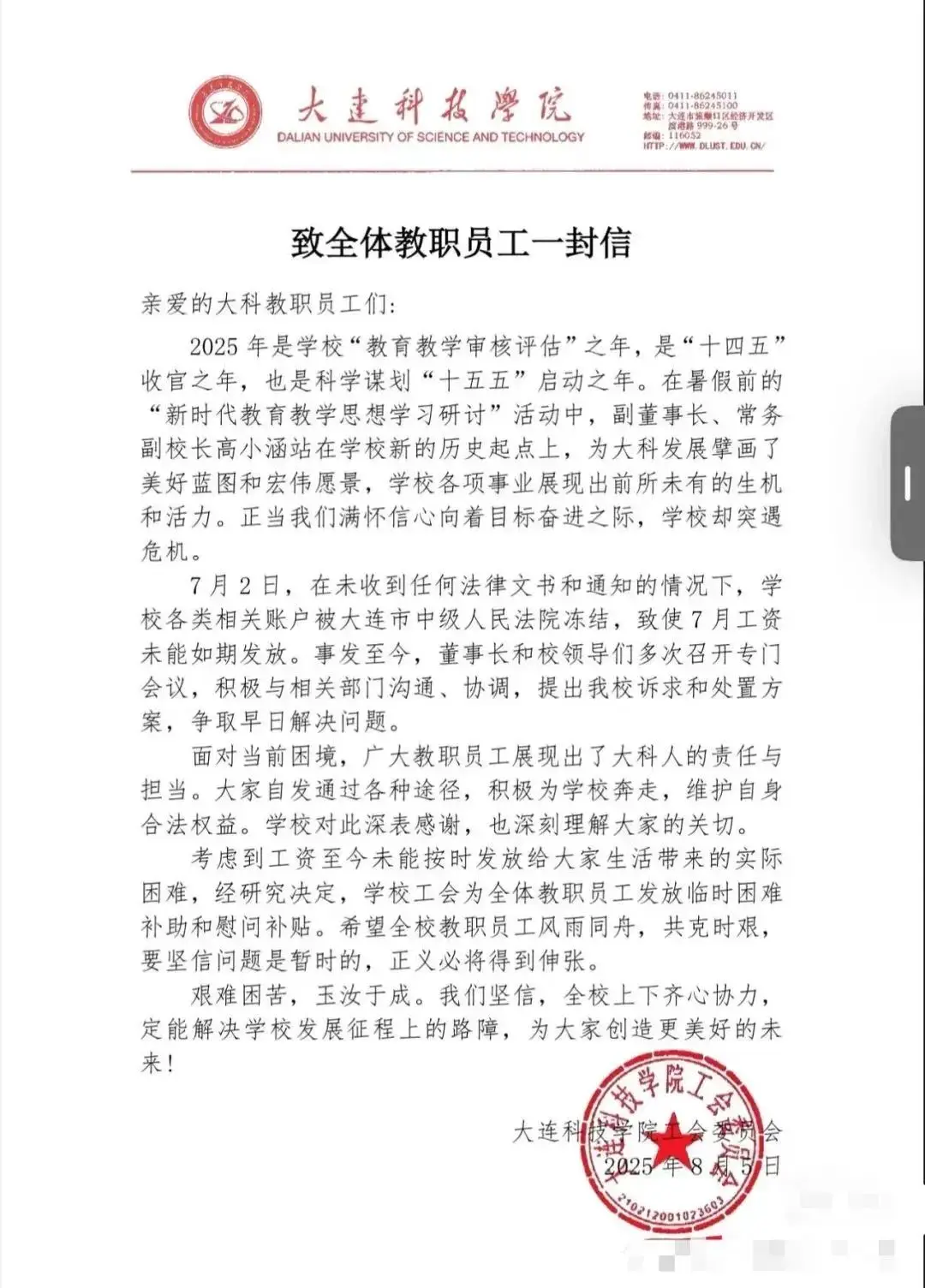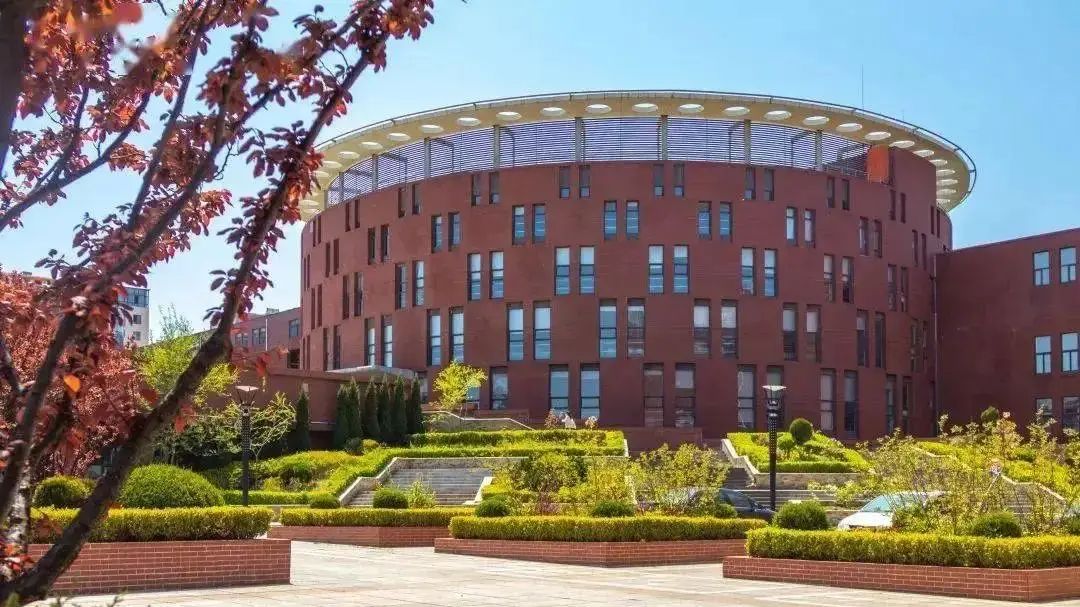A private university's account was suddenly frozen by the court, teachers' salaries were halted, yet it continued to enroll students and charge fees while renovating dormitories. The massive debt hole behind it reveals deep flaws in the regulatory system for private education. In late August 2025, as various universities prepared for the new semester, news about Dalian University of Technology's "all staff salary suspension, facing operational shutdown at the start of the semester" attracted widespread attention. Internal letters exposed by netizens showed that various accounts of the school were frozen by the Dalian Intermediate People's Court, resulting in the July salaries not being paid on time. Meanwhile, public information indicated that this private university had a total execution amount of up to 3.5 billion yuan, and its legal representative had 22 records of restricted high consumption. Even more concerning is that the school continued to enroll students normally despite such a severe financial crisis, with over 2,900 new students already having paid their tuition fees.

Origin of the incident: Account freeze and salary suspension: The Dalian University of Technology's Trade Union Committee released a letter to all faculty and staff on August 5, revealing the seriousness of the issue. The letter mentioned that various related accounts of the school were frozen by the Dalian Intermediate People's Court without any legal documents or notifications, causing the July salaries to be unpaid. The school’s trade union promised to provide temporary hardship subsidies and consolation subsidies to all faculty and staff. When a reporter called the school as a parent to verify, the staff in the office confirmed the authenticity of the online letter but stated, "The school is already working on resolving this issue." The staff emphasized, "The government will not let the school stop operating; our teachers will be back to work soon." However, as of August 23, when the reporter called the school's governing body, the Liaoning Provincial Department of Education, no one answered the phone.
Financial black hole: 3.5 billion yuan debt and 22 consumption restriction orders: Tianyancha information shows that Dalian University of Technology has a total of 2 records of being executed, with a total execution amount exceeding 230 million yuan; there are also 35 historical records of being executed, with a total execution amount reaching 3.5 billion yuan. Among them, on August 4, an additional execution recovery information was added, with an execution target exceeding 130 million yuan, and the executing court was the Dalian Intermediate People's Court in Liaoning Province. The school's legal representative, Gao Xiaohan, has 22 records of restricted high consumption, with cases mainly concentrated in financial loan contract disputes, debt transfer disputes, pawn disputes, and so on. Gao Xiaohan is not only the acting principal and legal representative of the school but also the legal representative of the school's parent company, Dalian Sunshine Century Education Industry. Public information shows that Dalian University of Technology is located in the Lushun Economic Development Zone of Dalian City, Liaoning Province, and is a private university specializing in science and engineering. The college was established in July 2002, originally as the Information Engineering College of Dalian Jiaotong University, and was restructured into a private ordinary undergraduate university, Dalian University of Technology, in 2011.
Magical reality: Enrollment and renovation during the crisis: Despite being mired in financial crisis, Dalian University of Technology's enrollment work is still proceeding as usual this year. The school's official WeChat account shows that in 2025, it has admitted over 2,900 undergraduate freshmen from 22 provinces across the country. A new student told reporters, "The admission notice I received required me to pay the tuition within ten days." The tuition announcement from Dalian University of Technology shows that the tuition for undergraduate programs is 26,000 to 28,000 yuan per year, while the tuition for vocational programs is about 18,000 yuan per year. A junior student reflected that regarding the salary suspension for all staff, he also learned about it online, and there has not been much internal discussion. However, the school recently renovated the dormitory buildings and has repeatedly promoted the dormitory environment during the enrollment season. In addition, the school also released a recruitment plan for 2025, hiring 42 people including full-time teachers, professional leaders, and counselors. This practice of "incurring debt while spending money" raises questions about the school's financial management system and transparency.
Deep-seated issues: Regulatory loopholes in private universities: The situation at Dalian University of Technology is not an isolated phenomenon. This incident reflects the problem of "black box" operations in the finances of private universities. According to Article 39 of the Law of the People's Republic of China on the Promotion of Private Education, the use of assets and financial management of private schools should be supervised by the approving authority and other relevant departments, and a financial accounting report should be prepared at the end of each accounting year, with an accounting firm entrusted to conduct audits in accordance with the law and publish the results. However, the current situation of Dalian University of Technology indicates that these regulations are essentially ineffective in practice. With a staggering debt of 3.5 billion yuan, the school can still enroll students, collect tuition fees, and renovate dormitories, which reflects a serious lack of financial transparency. Students and parents face an information-asymmetric "black box" when choosing schools, unable to ascertain the true financial health of the school or predict the risk of a potential "explosion" at any time.

Impact scope: The dilemma of students and faculty: For students already enrolled and newly admitted freshmen, the school's unstable situation is anxiety-inducing. Their biggest concern is, "What if the school closes before I finish my studies?" Although the school is deeply mired in financial crisis, current students seem to be unaware of the situation. A junior student interviewed stated that he also learned about the salary suspension for all staff online, and there has not been much internal discussion. For faculty, the suspension of salaries and reduction of benefits not only represents economic pressure but also a loss of professional dignity, which may ultimately lead to the loss of talented individuals and a decline in teaching quality. On August 24, the school responded that "the salary issue for July has been resolved, salaries are being paid normally, and the school is currently operating normally." However, the school also stated that it was "unclear about the source of the online rumors" and denied any previous salary arrears, claiming ignorance of the reported debts.
Future direction: The survival crisis of private universities: The predicament of Dalian University of Technology is not isolated. In recent years, many private universities have encountered difficulties in enrollment and poor management. For example, in 2025, Zhanjiang University of Technology faced significant resistance in enrollment in Guangdong, indicating a decline in public trust in private universities. Many netizens bluntly stated that rather than risk attending a private undergraduate program, it is better to choose a public vocational college, which is at least more stable and reassuring. This change in perception may further exacerbate the survival crisis of private universities. Dalian University of Technology's debt of 3.5 billion yuan is likely due to misappropriation of funds or other abnormal operational factors. This incident has also raised public concerns about the overall operational model of private universities. Education experts point out that running a university is originally a long-term investment process; the initial costs of building dormitories, purchasing equipment, and hiring teachers are indeed substantial, but once on track, the main source of income should be tuition fees, and such severe losses should not occur.

Dalian University of Technology still enrolled over 2,900 new students in 2025, and these new students were required to pay tuition fees within just ten days after receiving their admission notices. The annual tuition for undergraduate programs is about 26,000 yuan, while for vocational programs, it is around 18,000 yuan. Such urgent charging behavior raises suspicions about whether the school is using new students' tuition fees to alleviate financial pressure. Although the subsequent developments of the incident remain unclear, it is certain that the era of rough development for private universities has ended. Only by strengthening regulation, increasing transparency, and safeguarding the rights and interests of teachers and students can public confidence in private education be rebuilt.
